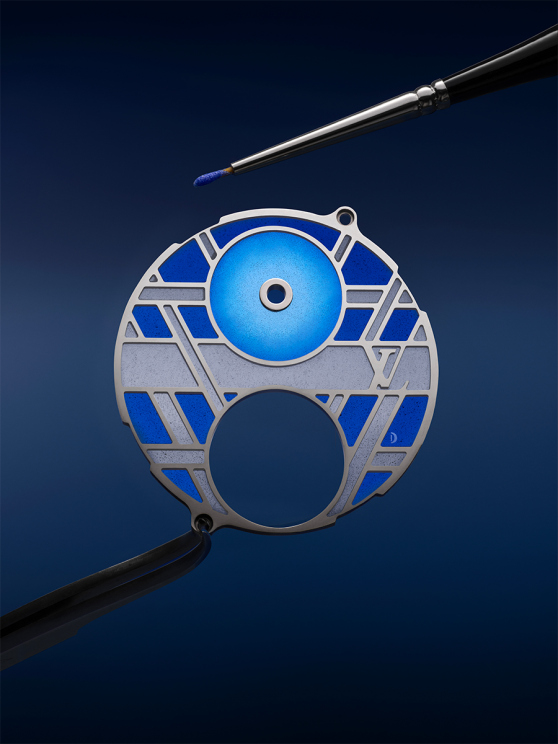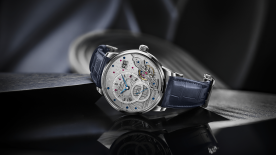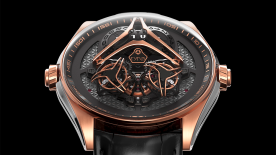The Voyager watch’s dial turns into a modern stained-glass window, revealing the perfection of a flying tourbillon movement developed at La Fabrique du Temps Louis Vuitton and bearing the prestigious Poinçon de Genève seal. A journey into the blue.
Mastering and reviving traditional expertise could well be Louis Vuitton’s byword. The Maison has placed craftsmanship at the core of its cardinal virtues since its earliest days. By choosing plique-à-jour enamel – a French word first recorded in 14th-century annals – Louis Vuitton intends to restore the prestige of this rare, complex technique, still used by exceedingly few artisans in Europe. Though this enamelling process is lengthy and very painstaking, the transparency, lustre, and colourful nuances it provides are second to none. Many months of research were needed to obtain this blue gradient. To achieve this, the Maison worked with several master enamellers within its atelier at La Fabrique des Arts. The dial of the Voyager Flying Tourbillon “Poinçon de Genève“ Plique-à-jour was crafted entirely within La Fabrique du Temps Louis Vuitton workshop.

A technical and artistic feat
The highly precise plique-à-jour technique, pioneered by Byzantine artisans in the 4th and 5th centuries CE, consists of depositing enamel into cells without the support of any backing. Louis Vuitton chose the ancient, Western “percé” – and most challenging – technique from among the different types of existing plique-à-jour methods.
To breathe life into this miniature stained-glass artwork, the enameller applied colour to each section using a paintbrush, in keeping with the most traditional technique: capillary action fill. Given that the material is not deposited directly onto the dial’s back, but rather into open cells, the enameller’s movements must be quick and light to ensure that the enamel spreads evenly and without air pockets. The result on such a surface is a real technical feat, providing the Voyager watch with unprecedented clarity and light. The visually striking white gold dial, featuring repeated interlocking Vs for Vuitton, showcases a vivid, luminous, and modern reinterpretation of plique-à-jour enamel. This effect is only heightened by the timepiece’s exquisite colourway and the dimensions of the enamelled surfaces – as demonstrated by the central dial at 12 o’clock, whose sumptuous gradient of three shades of blue varies in saturation and opalescence between ultramarine, azure and blue grey.
Beyond the difficulties in obtaining plique-à-jour enamel on a larger surface, the hand pipe’s placement speaks to Louis Vuitton’s technical mastery. To ensure a perfect set of hands, the pipe must be precisely centred and adjusted by hand down to the millimetre. The component seems to float serenely in the centre of this blue dial, permanently affixed thanks to a meticulous application of enamel. This achievement is further proof of our in-house enamellers’ ingenuity and experience.
In total, five to six layers of translucent enamel – and the same number of kiln firings – are needed to obtain this impressive level of transparency, with around 100 hours of work going into every dial.
This mesmerising work of art is allowed to shine in the Voyager’s avant-garde case, defined by a circle within a square, whose architecture provides the watch with even more radiance. By letting light pass through the dial, this type of enamel sets the stage for a chiaroscuro effect, casting infinite nuances onto the watch mechanism. This virtuoso design is paired with a unique skeleton movement: the Poinçon de Genève hand-wound LV104 calibre, which is hand-finished down to the smallest cog. By bringing together the exceptional know-how of plique-à-jour enamel and the mastery of a flying tourbillon movement, La Fabrique du Temps Louis Vuitton perfectly captures the essence of High Watchmaking.

A top-flight mechanism
Developed and designed exclusively within La Fabrique du Temps Louis Vuitton, this flying tourbillon is the hallmark of the brand’s virtuosity in the field of contemporary High Watchmaking.
Louis Vuitton chose to feature an ethereal and innovative version of the most iconic watchmaking complication. Over 120 hours of work went into assembling all 168 parts of this calibre, which boasts an 80-hour power reserve.
The carriage of the iconic governor has been shaped into a capital V, which spins on itself in a minute. The V’s dynamic, coupled with the movement’s vertical positioning and the dial’s plique-à-jour motifs, bestows a truly unique personality to this tourbillon.
What is even more remarkable is that the Voyager Flying Tourbillon “Poinçon de Genève“ Plique-à-jour bears the illustrious Poinçon de Genève seal. Established in 1886, The Geneva Seal attests to the utmost level of manufacturing and finishing of all the components that go into making a watch. Appearing at 9 o’clock, the seal shines clearly from beneath the enamelled dial.
Through the union of skilled artistry taken to its pinnacle, an exceptional mechanical calibre and a Poinçon de Genève seal, the Voyager Flying Tourbillon “Poinçon de Genève“ Plique-à-jour is a true watchmaking masterpiece, infused with the visionary spirit that has fuelled Louis Vuitton since its founding in 1854.







